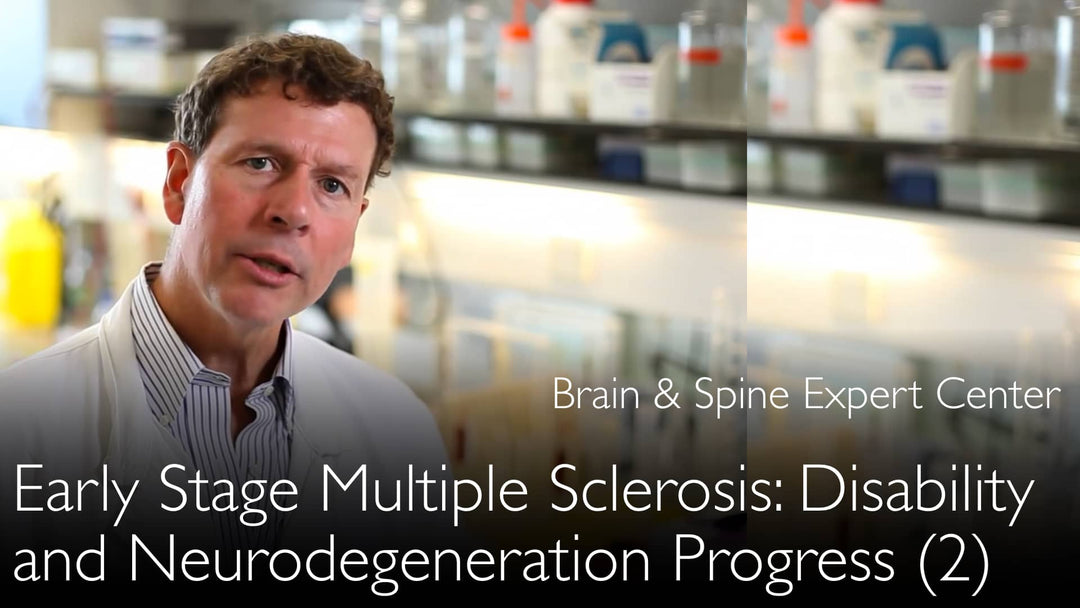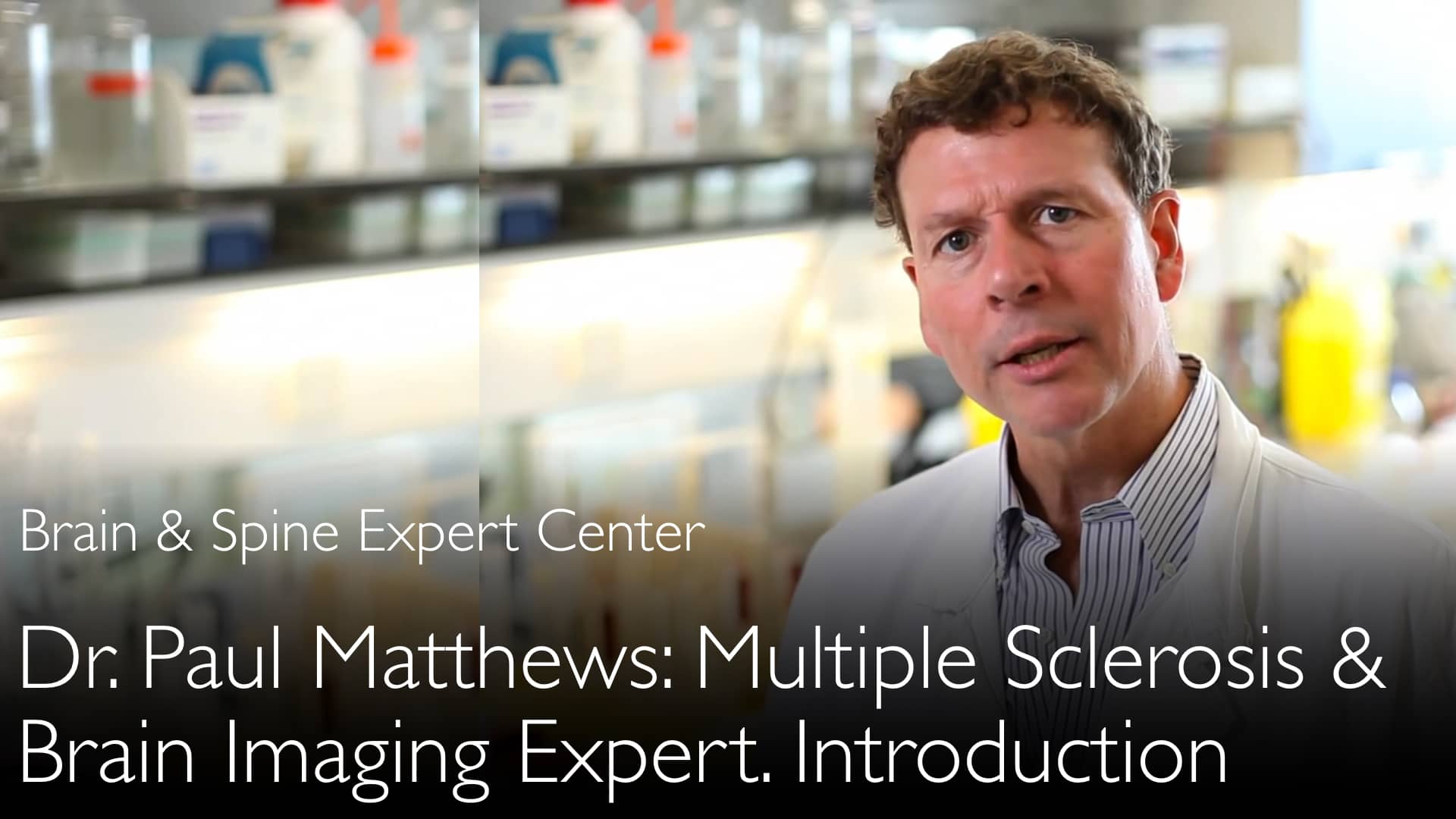O renomado especialista em neurodegeneração da esclerose múltipla, Dr. Paul Matthews, explica que o dano cerebral precoce na EM não causa incapacidade imediata. Ele detalha a notável capacidade do cérebro de realizar reparos adaptativos e compensações. O Dr. Matthews descreve como essa resiliência é gradualmente perdida com o acúmulo de lesões, resultando na incapacidade progressiva e irreversível observada nos estágios avançados da doença. O tratamento anti-inflamatório precoce é fundamental para retardar esse processo neurodegenerativo.
Compreensão dos Danos Cerebrais Precoces e da Progressão da Incapacidade na Esclerose Múltipla
Ir para a Seção
- Danos Cerebrais Precoces na EM
- Incapacidade versus Lesão Cerebral
- Resiliência e Compensação Cerebral
- Perda da Adaptabilidade Cerebral
- O Estágio Progressivo da EM
- Importância do Tratamento Precoce
- Transcrição Completa
Danos Cerebrais Precoces na Esclerose Múltipla
Os danos cerebrais ocorrem muito cedo em pacientes com esclerose múltipla. O Dr. Paul Matthews, MD, ressalta que essa lesão inicial frequentemente não causa incapacidade permanente. Este é um conceito crucial para entender a progressão da doença. Os sintomas clínicos que o paciente apresenta não refletem diretamente a neurodegeneração subjacente.
Incapacidade versus Lesão Cerebral
A incapacidade na EM decorre de danos cerebrais, mas não é uma medida direta deles. O Dr. Paul Matthews, MD, explica que, nas fases iniciais, qualquer incapacidade geralmente está ligada a processos inflamatórios focais ativos. Essa incapacidade costuma ter resolução parcial após um surto. Por isso, o estado clínico isolado do paciente não é suficiente para decidir sobre a necessidade de tratamento.
Resiliência e Compensação Cerebral
O cérebro humano tem uma capacidade notável de reparo adaptativo. O Dr. Paul Matthews, MD, descreve como essa resiliência ajuda a preservar o comportamento e a minimizar a incapacidade inicialmente. Lesões em grandes feixes de axônios podem ser compensadas pelo recrutamento de áreas cerebrais vizinhas. Em alguns casos, até regiões mais distantes assumem funções de áreas danificadas.
Essa reorganização permite que os pacientes mantenham a capacidade de realizar tarefas, mesmo com perda irreversível de axônios. O Dr. Anton Titov, MD, e o Dr. Paul Matthews, MD, discutem como esse mecanismo compensatório é a principal razão pela qual a incapacidade não se manifesta nos estágios iniciais da doença.
Perda da Adaptabilidade Cerebral
Com a progressão dos danos cerebrais na esclerose múltipla, a capacidade de compensação diminui. O Dr. Paul Matthews, MD, afirma que a resiliência cerebral acaba se esgotando. É nesse momento que o dano funcional irreversível se torna clinicamente aparente. O cérebro não consegue mais se reorganizar para compensar as lesões acumuladas.
O Estágio Progressivo da EM
Os pacientes entram em um estágio progressivo irreversível quando o cérebro não pode mais compensar. O Dr. Paul Matthews, MD, cita o exemplo de lesões seriadas no trato corticoespinhal da medula espinhal. Após danos repetidos no mesmo sistema funcional, a recuperação motora finalmente falha. A partir daí, cada nova lesão e perda axonal contribui diretamente para o agravamento da incapacidade.
Importância do Tratamento Precoce
A intervenção precoce é fundamental na esclerose múltipla. O Dr. Paul Matthews, MD, afirma que quase todos os pacientes necessitam de algum tipo de tratamento anti-inflamatório. O principal objetivo é retardar ou interromper a neurodegeneração contínua. Ao tratar cedo, os médicos buscam preservar a resiliência cerebral natural e adiar o colapso dos mecanismos compensatórios, prevenindo ou postergando a incapacidade permanente.
Transcrição Completa
Dr. Paul Matthews, MD: As implicações da perda de volume cerebral na esclerose múltipla são profundas. A incapacidade em si não mede a extensão do dano cerebral. A incapacidade na EM decorre de danos cerebrais, mas esses danos ocorrem precocemente. Em pacientes com EM, os danos cerebrais surgem primeiro sem causar incapacidade permanente.
Portanto, o estado clínico do paciente não deve ser o único critério para decidir sobre a necessidade de tratamento. Os sintomas clínicos são relevantes para orientar o tratamento em certa medida.
Dr. Anton Titov, MD: Quase todos os pacientes com esclerose múltipla precisam de algum tipo de tratamento anti-inflamatório.
Dr. Paul Matthews, MD: Precisamos retardar ou interromper o processo de neurodegeneração na EM. Muitos se perguntam: o dano progride continuamente ao longo da doença?
Dr. Anton Titov, MD: Por que os sintomas clínicos e a progressão do dano neuronal e axonal não se traduzem em incapacidade? Por que a incapacidade não aparece nos estágios iniciais da esclerose múltipla?
Sabemos que pacientes com EM inicial não têm incapacidade permanente. Ou a incapacidade presente está diretamente relacionada a processos inflamatórios focais. Na EM inicial, a incapacidade geralmente apresenta melhora parcial.
Dr. Paul Matthews, MD: Realizamos pesquisas pioneiras sobre esse tema. Desde então, os achados sobre a progressão dos danos cerebrais foram replicados por vários grupos e ampliados de diversas formas.
Demonstrou-se que o cérebro tem uma capacidade notável de reparo adaptativo, o que ajuda a preservar o comportamento na EM. A resiliência cerebral mantém a capacidade de realizar tarefas e minimiza a incapacidade.
Isso ocorre mesmo na presença de alterações permanentes e perda de axônios.
Explico com mais precisão: nos estágios iniciais da EM, lesões em grandes feixes de axônios podem ser compensadas pelo recrutamento de áreas cerebrais adjacentes. Às vezes, até regiões mais distantes assumem funções de áreas danificadas.
Isso acontece em alguns casos, pois o restante do cérebro permanece relativamente preservado.
A EM causa perda axonal irreversível precocemente, mas o cérebro consegue se reorganizar significativamente. Com a progressão dos danos, a capacidade compensatória cerebral começa a declinar gradualmente. A resiliência cerebral se esgota.
Dr. Anton Titov, MD: É quando o dano irreversível se torna aparente.
Dr. Paul Matthews, MD: Além disso, sabemos que múltiplos danos ao mesmo sistema funcional acabam superando a capacidade de compensação adaptativa. Por exemplo, lesões seriadas no trato corticoespinhal da medula espinhal podem ocorrer.
Então, a recuperação da função motora simplesmente não acontece. O paciente entra no estágio progressivo irreversível da EM.
A partir daí, cada novo dano cerebral, cada perda adicional de axônios, resulta em piora do estado de incapacidade do paciente.





